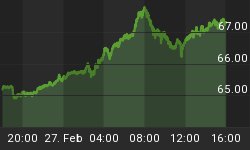Why read: Because late Friday afternoon after the European markets closed the results of Spain's bank audit was publicly released. It is reminiscent in some respects of the U.S. Bank Stress Test report issued earlier this year by the Federal Reserve, and you should know something about the assumptions upon which the report is based.
Commentary: A long awaited independent audit result released following Friday's European financial markets close has reported that consultancy Oliver Wyman has said Spain's fourteen main banks collectively would need 59.3 billion euros in new capital in an 'adverse scenario' where during the three year period 2012 to 2014 it is assumed that Spain's:
-
GDP contracts by a cumulative 6.5%;
-
unemployment reaches 27.2%; and,
-
house and land price indices drop by 25% and 60% respectively.
Note: if house and land prices drop in Spain in the next two years by such rates it strikes me that Spain will have problems that extend well beyond under-capitalized bank balance sheets.
Seven of those fourteen banks are reported as having failed the stress tests imposed on them by Oliver Wyman.
Oliver Wyman is said to have been assisted by the 'Big Four' audit firms, and supervised by the European Central Bank and the International Monetary Fund.
As might be expected, the Oliver Wyman report includes very specific qualifications, assumptions and limiting conditions. Specifically:
-
the "criteria, working methods, assumptions and processes ... have been formulated, specified and required" by the Banco de Espana and/or a Steering Committee (comprised of representatives of the 'Expert Committee') and an Expert Committee (comprised of the Banco de Espana, the Misisterio de Economia y Competitividad, the European Banking Authority, the European Commission, the European Central Bank, and the International Monetary Fund);
-
the Steering Committee provided Oliver Wyman with the base and adverse macro-economic scenarios Oliver Wyman adopted when making its Spanish bank stress test calculations. As noted at page 83 of the report, the adverse macro-economic scenario was deemed by the Steering Committee to be conservative on two counts:
-
relative to a 30 year Spanish history, and
-
relative to scenarios used in stress tests conducted in other jurisdictions;
-
Note: On their face, neither of these criteria strike me as being good rationalizations for 'conservatism'. This is because the globalized world today is very different from what it was 15 years ago, much less 30 years ago, the Eurozone has only existed since 1999 while the euro currency began circulating only 10 years ago, and because Spain and its economy can be presumed to have its own unique characteristics and prospects.
-
Oliver Wyman specifically disclaimed responsibility for said "criteria, working methods, assumptions and processes";
-
information, reports and valuations produced by real estate specialists were not independently validated by Oliver Wyman;
-
importantly, Oliver Wyman quite properly stated its report was relevant as at "a particular date" (presumably September 28, 2012, the date of its report) and that changed circumstances after that date could impact the conclusions expressed in its report; and,
-
while I may have missed it, I could find no 'sensitivity analysis' in the Oliver Wyman report.
The bottom line of this would appear to be that Oliver Wyman calculated a result based on assumptions and information provided to it by others, which assumptions and information it assumed no responsibility for.
There is nothing really wrong with that, so long as no one reading the Oliver Wyman report or media coverage with respect to it does not conclude that Oliver Wyman developed its own assumptions, tested the data provided to it, and hence expressed its own independent opinion as to the extent of the current undercapitalization of Spain's banks.
For me, all of the foregoing goes to the following question: What weight ought to be placed on the 'undercapitalized amounts' stated in the report under each of the 'base scenario' and 'adverse scenario' as quantified in the report? Given all of the foregoing, for me the conclusions set out in the Oliver Wyman report may be credible, or may prove to be credible, but for the time being I am far from being convinced.
The Oliver Wyman report received, as one would expect, favourable review from IMF Managing Director Christine Lagarde. One can only hope that Ms. Lagarde has taken the time to thoroughly understand:
-
the assumptions and qualifications that underlie that report, and that she understands and agrees with them; and,
-
the detail underlying the report.
If interested, you can read the ninety-five page Oliver Wyman report here. Given what might prove to be serious contagion issues, whether or not this report turns out to have reached credible conclusions is potentially important beyond Spain in a Eurozone, European Union and World economic context. Accordingly, as a minimum I suggest you read the:
-
Qualifications, Assumptions & Limited Conditions section (2 pages);
-
the Executive Summary (5 pages); and,
-
Appendix 2: Macroeconomic scenarios (2 pages)
and reach you own conclusion(s) as to the weight one ought to give to the conclusions set out in this report.
Finally, you might want to read Spain debt rises on aid to banks, regions, finance costs. That article discusses what currently is being forecast by Spain's government as that country's debt:GDP ratio by the end of 2013 (90.5%), continuing protests, and notes once again Spain's Catalonia region's 'calls for independence.
Topical References: Spain banks need a 60-billion euro bailout, stress tests reveal, from The Financial Post, from Reuters, September 28, 2012 - reading time 3 minutes. Also see:
-
Spanish banks need 60 bn euros, independent auditors say, from The Telegraph, Louise Armitstead, September 28, 2012 - reading time 4 minutes;
-
IMF Managing Director Christine Lagarde Welcomes the Completion of Spain's Banking Sector Valuation, from The International Monetary Fund, September 28, 2012 - reading time 1 minute; and,
-
Spain debt rises on aid to banks, regions, finance costs, from Reuters, September 30, 2012 - reading time 4 minutes.















